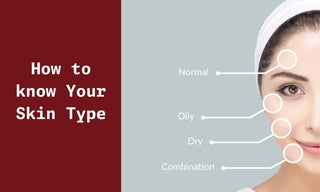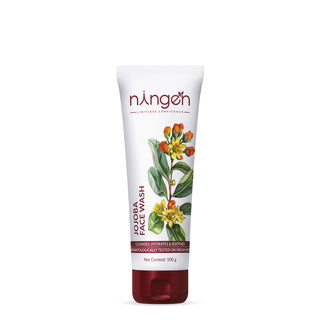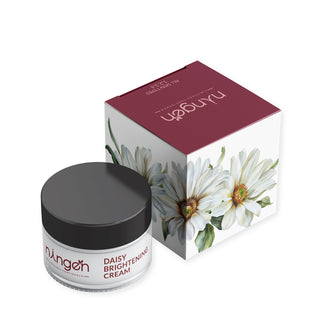Your skin, the body's largest organ, is a canvas that tells a story of your overall health and well-being. Just like any canvas, it requires personalized care and attention. One of the first steps toward an effective skincare regimen is understanding your skin type. From oily to dry, combination to sensitive, each skin type has unique characteristics and needs. In this guide, we'll dive deep into how to know your skin type, helping you decipher your own and tailor your skincare routine accordingly.
In This Article;
- Why Knowing Your Skin Type Matters
- The Five Common Skin Types
- How to know your skin type? Conducting a Simple Skin Test
- Matching Your Skincare Routine to Your Skin Type
- Know Your Skin With Advanced SkinSenseAI by Ningen Skin Science
- Wrapping Up
- TL;DR(Too Long Didn't Read)
- Frequently Asked Questions
Why Knowing Your Skin Type Matters
Imagine trying to solve a puzzle without knowing the pieces. Similarly, without understanding your skin type, your skincare routine might be a shot in the dark. Using products that aren't suitable for your skin type can lead to various issues, from excess oiliness and breakouts to dryness and irritation. By identifying your skin type, you can make informed decisions and choose products that cater to its specific requirements.
The Five Common Skin Types
Normal Skin: Consider yourself lucky if your skin falls into this category. Normal skin is well-balanced, with even texture and consistent oil production. It's neither too oily nor too dry, and it rarely experiences breakouts. A gentle cleansing routine and basic moisturization are often enough to maintain its natural glow.
Oily Skin: If you find yourself blotting your face throughout the day, you likely have oily skin. This skin type produces excess sebum, which can lead to enlarged pores, blackheads, and acne. Look for oil-free or mattifying products to control shine and balance oil production.
Dry Skin: Dry skin feels tight, especially after cleansing, and is prone to flakiness and redness. It lacks natural moisture and requires deep hydration to restore its suppleness. Cream-based moisturizers, hydrating serums, and gentle cleansers are your allies in combating dryness.
Combination Skin: A blend of two or more skin types, combination skin can be a bit tricky to manage. Typically, the T-zone (forehead, nose, and chin) is oilier, while the cheeks are drier. Tailor your skincare routine to cater to both aspects. Use a gentle cleanser, a balanced moisturizer, and consider spot treatments for specific concerns.
Sensitive Skin: If your skin easily reacts to new products with redness, itching, or burning sensations, you likely have sensitive skin. This skin type requires extra care and attention. Opt for fragrance-free, hypoallergenic products with soothing ingredients like aloe vera and chamomile.
How to know your skin type? Conducting a Simple Skin Test
You don't need to be a dermatologist to determine your skin type. A simple at-home test can give you valuable insights. Here's how to know your skin type:
Morning Check: Begin your day by gently cleansing your face with a mild cleanser. Don't apply any products afterward. Observe how your skin feels throughout the day. Does it become shiny and oily by midday? Or does it remain relatively balanced?
Bare-Faced Observation: In the evening, after removing makeup (if you wear any) and cleansing your face, take a close look at your skin. Is it tight and uncomfortable? Do you notice flaky or dry patches? Or does it feel comfortable and supple?
Tissue Test: Before cleansing your face in the morning, take a tissue and press it against different areas of your face. Pay attention to the T-zone, cheeks, and chin. If you notice oil residue on the tissue, you likely have oily skin in those areas.
Pore Examination: Stand in front of a mirror with good lighting and examine your pores. Are they visibly enlarged, especially on your nose and forehead? This could indicate oily skin. If your pores are small and not very noticeable, your skin might lean toward normal or dry.
Matching Your Skincare Routine to Your Skin Type
Once you've determined your skin type, it's time to curate a skincare routine that caters to its unique needs:
Cleansing: Choose a gentle cleanser that doesn't strip your skin of its natural oils. Foaming cleansers are great for oily skin, while cream cleansers work well for dry skin. Combination skin benefits from a balanced cleanser.
Exfoliation: Exfoliate 1-3 times a week, depending on your skin's tolerance. Oily skin benefits from chemical exfoliants like salicylic acid, while sensitive skin might prefer gentle physical exfoliants.
Moisturization: Hydration is key for all skin types. Oily skin can opt for lightweight, oil-free moisturizers, while dry skin requires richer, cream-based options. Combination skin should use products that balance moisture levels.
Sun Protection: Regardless of your skin type, sunscreen is non-negotiable. Look for a broad-spectrum SPF that suits your preferences – gel-based for oily skin, moisturizing for dry skin.
Targeted Treatments: Introduce serums or treatments based on your specific concerns, like acne, fine lines, or pigmentation. Choose products formulated for your skin type to ensure compatibility.
Know Your Skin With Advanced SkinSenseAI by Ningen Skin Science
Simple skin tests help you find your skin type, but what about concerns? You might have oily skin but your skin may be dehydrated from inside. Your skin looks normal but you might have uncounted open pores. You may have pigmentation that you are not aware of. Your skin tan may be deeper than you think. How to know about all these without visiting a dermatologist?
This is where Ningen SkinSenseAI comes into play. This highly advanced tool looks closely at different aspects of your skin and deals with your specific skin concerns. Ningen SkinSenseAI is an amazing virtual advisor of your skin that not only evaluates your skin but also recommends your skincare needs in no time.
All you have to do is just go to www.ningen.com and take the SkinSenseAI test by following the instructions. Within a few seconds, you will get the result.
Additionally, the tool also suggests the ingredients your skin needs along with product recommendations.
Ningen Products offer comprehensive solutions for diverse skin concerns. Ningen Rosehip Serum revitalizes dry skin, infusing deep moisture and restoring suppleness. The acne-fighting Jojoba Face Wash contains white tea to unclog pores and prevent breakouts, promoting clear skin. For anti-aging, the Restorative Anti Wrinkle Skin Cream reduces fine lines and wrinkles, enhancing skin's youthful appearance. Ningen Gold Peel Off face mask with oat extract calms sensitive skin, reducing redness and irritation. From dryness to acne and aging, Ningen Products deliver targeted care, unveiling healthy, radiant skin for all.
Adapting to Change
Remember that your skin type can change over time due to factors like age, climate, and hormonal fluctuations. It's important to reassess your skin type and adjust your routine accordingly periodically.
Explore our carefully selected assortment of recommended products that suits all types of skin.
Wrapping Up
Hope you found this article on how to know your skin type helpful. Understanding your skin type is the foundation of a successful skincare journey. Armed with this knowledge, you can confidently select products that align with your skin's unique needs. From a balanced cleanser to targeted treatments, your tailored routine will pave the way for radiant, healthy skin that tells the story of your self-care commitment.
"Your skin type is the key to unlocking a skincare routine that works specifically for you."
Quick view
Understanding your skin type is crucial for effective skincare. The five common skin types are normal, oily, dry, combination, and sensitive, each requiring specific care. You can determine your skin type through simple at-home tests, like observing how your skin feels throughout the day, using a tissue test, and examining your pores. Once you know your skin type, you can tailor your skincare routine with appropriate cleansers, exfoliants, moisturizers, sun protection, and targeted treatments. Additionally, tools like Ningen SkinSenseAI can provide a deeper analysis of your skin concerns and recommend suitable products. Remember, your skin type can change over time, so reassess periodically.
Frequently Asked Questions
Q1. What are the common skin types?
There are five common skin types: Normal, Oily, Dry, Combination, and Sensitive. Each has distinct characteristics and requires specific care.
Q2. How can I determine my skin type at home?
You can determine your skin type at home through several methods:
- Morning Check: Observe how your skin feels in the morning after cleansing.
- Bare-Faced Observation: Note any dryness or oiliness throughout the day.
- Tissue Test: Press a tissue against different areas of your face to check for oil.
- Pore Examination: Look at your pores to see if they are enlarged or small.
Q3. What does normal skin feel like?
Normal skin is well-balanced, with even texture and consistent oil production. It feels smooth, supple, and generally free from sensitivity or excess oil.
Q4. How does oily skin behave?
Oily skin produces excess sebum, leading to a shiny complexion, enlarged pores, and a tendency for blackheads and acne breakouts.
Q5. What are the characteristics of dry skin?
Dry skin feels tight, especially after cleansing, and is prone to flakiness, redness, and irritation. It lacks natural moisture and may have a rough or uneven texture.
Q6. What does combination skin look like?
Combination skin is characterized by oiliness in the T-zone (forehead, nose, and chin) and dryness or normalcy in other areas, like the cheeks.
Q7. How does sensitive skin react?
Sensitive skin reacts easily to products with redness, itching, or burning sensations. It requires gentle, soothing skincare to prevent irritation.
Q8. Can my skin type change over time?
Yes, your skin type can change due to factors like age, hormonal fluctuations, climate, and skincare routines.
Q9. Why is it important to know my skin type?
Knowing your skin type helps you choose the right products and develop a skincare routine that addresses your specific needs, preventing issues like breakouts, dryness, or irritation.
Q10. What products should I use for my skin type?
Normal Skin: Gentle cleansers and light moisturizers. - Oily Skin: Oil-free or mattifying cleansers, and non-comedogenic moisturizers. - Dry Skin: Creamy cleansers and rich, hydrating moisturizers. - Combination Skin: Balanced cleansers, lightweight moisturizers, and spot treatments as needed. - Sensitive Skin: Fragrance-free, hypoallergenic products with soothing ingredients like aloe vera and chamomile.











Vana
Understanding your skin type is the foundational step to crafting an effective skincare routine, and this article breaks it down beautifully. I appreciate the way Ningen describes the various skin types (normal, dry, oily, combination, and sensitive) and provides clear, practical methods for self-assessment.